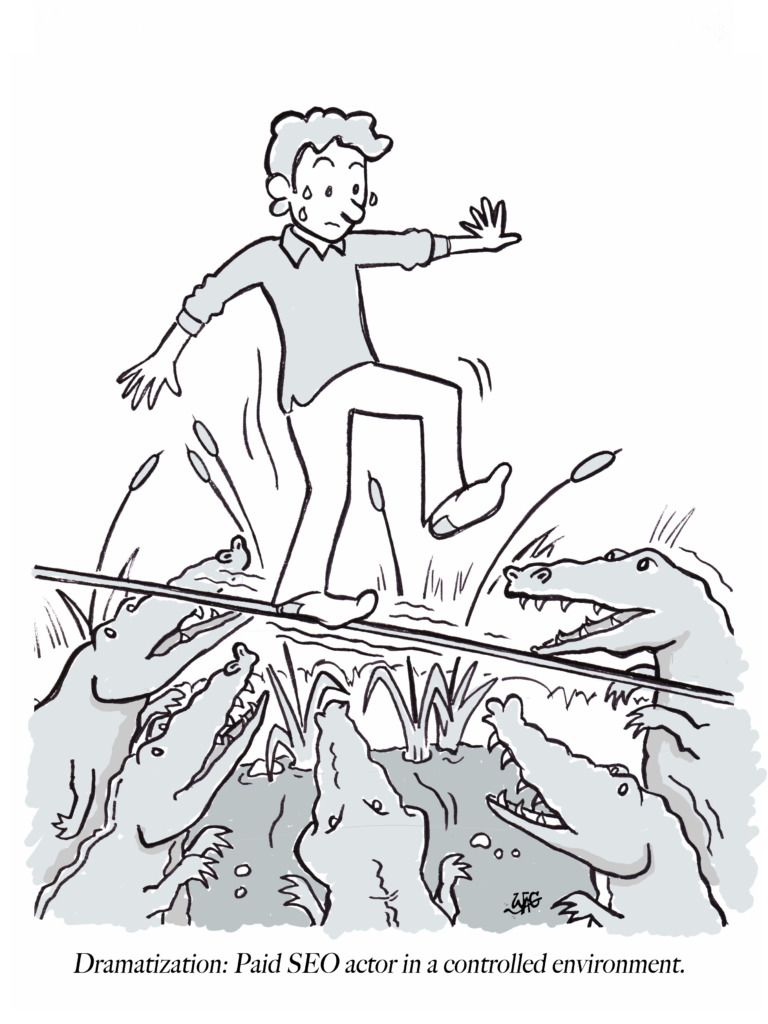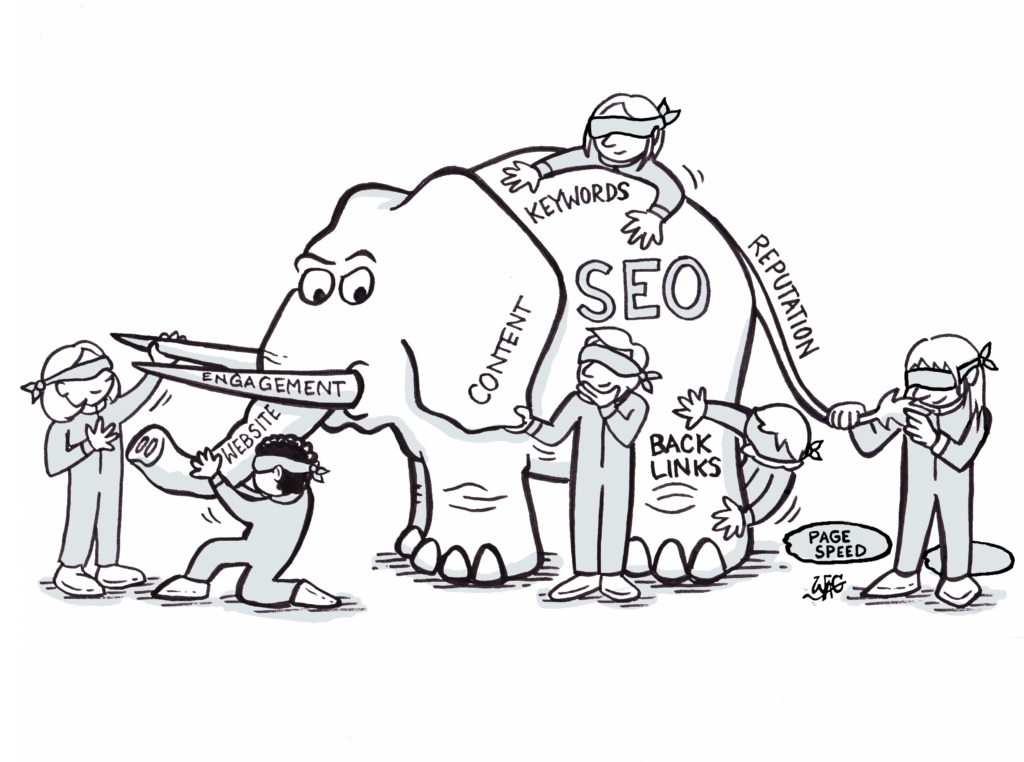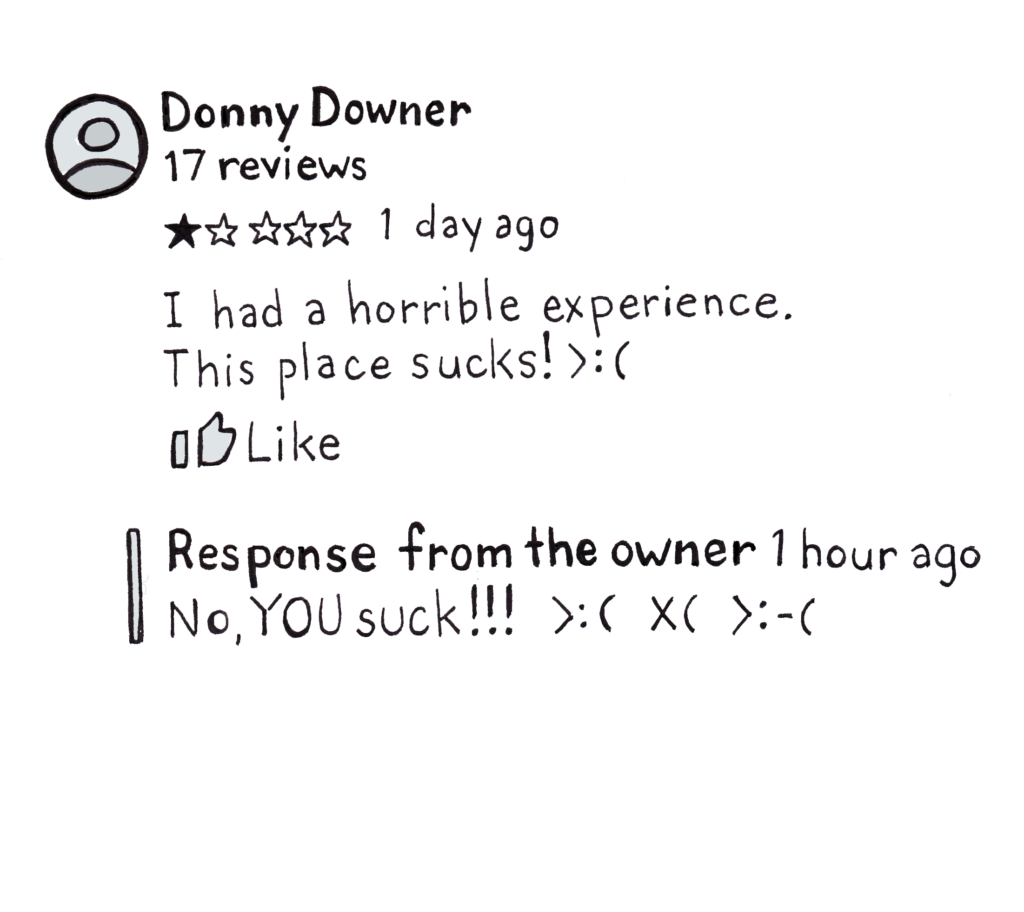
How can I improve my SEO and appear higher in search results?
One of the most common questions we get in digital marketing is how a business can rank higher on Google’s Search Engine Results Page (SERP).
When you search for SEO and SEO strategies you’ll find an overwhelming array of lists on how to improve your ranking. I’m here to tell you what you’re probably already doing (and doing wrong) and how to fix it. Here are the top 5 pitfalls of SEO that beginner’s make.
The 5 Pitfalls of SEO
1. Focusing too much on keywords
Don’t get me wrong, keywords are vital to your strategy. You need to understand your business, services, and products in relation to your customers’ needs. Getting inside the mind of your customer is going to help you determine what they’re looking for and how your company provides that solution.

Often people think that keywords are synonymous with SEO. They focus all their resources on creating the best keyword lists without understanding that keywords are not the answer to SEO but merely one factor in a multifaceted algorithm. Understanding your customers’ story helps you determine your keywords and search terms which lay the foundation to a greater marketing strategy to improve your SERP ranking.
Take the time to construct a keyword list but know that this is just the start of your strategy. You will factor these in your pay-per-click (PPC) advertising, content marketing, and website to strengthen your authority on these keywords.
2. Not Creating Content
With businesses focusing so heavily on keywords they tend to overlook one of the best uses for those keywords – content. Looking through many company websites, you’ll notice that their blog or thought leadership section isn’t updated on a regular basis or is lacking completely. You’ll see a few blog posts from 2017 and then nothing until the beginning of 2019. You can tell when they had time to write and when they gave up.
Creating content for your website is imperative to connect with your customers. Not only does content like case studies, blogs, news, and thought leadership show your customers what you are capable of with real world examples, but it also cultivates brand awareness, trust, and begins a conversation with your customers.
Still have that keyword list handy? Great. You’ll use it when creating blog posts that demonstrate your knowledge on each of those topics. In turn, Google will register the use of those keywords on your website. When a customer searches that keyword, Google will show them your website because it has crawled your page and knows that you might be the best solution to that query.
3. Backlinks

I know what you might be thinking. What’s a backlink? And that is exactly why this is a pitfall. Backlinks are links from other websites and resources that link back to your website. For example, you make some news in your industry and get picked up by some trade magazines or get referenced in an online article. That article might insert a link to your website address so readers can click through to view your website and learn more about your company. That is a backlink.
Backlinks are another large component to ranking higher on SERPs. The more reliable backlinks you have connecting to your website, the higher your Domain Authority. Meaning, the more your website is viewed as an authority on that specific topic (keyword) the higher the likelihood it will rank. When someone looks up one of your keywords, they might see not only your website but also other articles that reference your website relating to that topic.
So get out there, make some news, make an impact in your community, and always ask for that link when an article, blog, journal, directory, or anything online references your site.
4. You’re Using a Dated or Clunky Website
Websites matter. Let’s face it, in today’s world your website is your store front. It is a large part of your brand, your story, and it is often the first impression you make on your customer. So why are you still using the website you created when you purchased your domain in the early 2000’s? Or worse, why did you build your website last year, but it looks like it was built in the early 2000’s?
User experience is another factor in SERP ranking algorithms. This means that you want the experience on your website to be as user friendly as possible. You’ll want to optimize your page speed (if your page loads too slow – people won’t stick around to see what you have to offer) and make sure that your site is well organized. Don’t make your customer click around forever to navigate to your most popular product/service/feature. Your website should not be a mystery. It should be easy to access the information that is most vital to the decision-making process.
Nowadays beautiful websites are expected, and it is jarring when you visit one that is not. Think about what a dated or unorganized website tells your customers. Think about what it tells prospective employees. If that’s not the impression you want them to have then make your website a priority.
Oh yeah, still have those keywords? Perfect! You’ll want to add them into your website so search engines know what your company does and what it offers.
Pro Tip: There are many factors that can increase your page load speed. One of the best things you can do is to migrate your website to a better host (ie. WordPress) which has better servers and Content Delivery Networks (CDNs) than most free website hosts.
5. Ignoring Reputation, EAT, and YMYL

I’ll explain the alphabet soup in just a second, but let’s start with the easiest concept, reputation. Know what your customers are saying about you. In today’s world you need to stay on top of your reputation management. This goes for google reviews, social media mentions, comments, and direct messages, and anywhere else you might be (Yelp, Angie’s List, Glassdoor, etc.). Have a plan in place for both good and bad reviews on all platforms. How quickly you respond to your customers could make or break your brand trust.
EAT or Expertise, Authoritativeness, and Trustworthiness. This concept is weighing more and more heavily in SEO. It refers to that Domain Authority I mentioned earlier but also your customers’ and Google’s perception of your brand and website. EAT ties closely into your content marketing strategy and backlinks as well. Is your website linked to other reputable sources and sites? Is your content considered SPAM? Do you have toxic backlinks? How is the overall health of your website? If you are in ecommerce, what is your delivery guarantee? How quickly do you respond to customer queries and reviews? These are trickier to manage and it can be helpful to hire an agency to stay on top of this or make sure it is a priority in your marketing department.
Lastly is Your Money or Your Life (YMYL) sites. I’ll touch on this briefly because this is more advanced and because I could write a lot about YMYL sites.
First, you’ll want to determine if your website falls into Google’s YMYL category and then you’ll need to understand how to optimize it to ensure it ranks higher. According to Google, YMYL sites are websites that impact a person financially or their current or future well-being (ie. Your money or your life). Google’s examples of YMYL pages are:
- Pages soliciting personal information, such as personal identification numbers, bank account numbers, driver’s license numbers, etc., which could be used for identity theft.
- Pages used for monetary transactions, on which users might give their credit account or bank account information; for example any page that allows you to buy something.
- Pages offering medical or health information that could impact your physical well being.
- Pages offering advice on major life decisions, such as parenting, purchasing a home, a vehicle, etc.
- Pages offering advice on major life issues that could impact your future happiness and finances, such as giving legal or financial advice.
Why are these pages important to SEO? Because they are held to a higher standard of Page Quality than other pages. Google specifically has human search quality raters that go through these websites to determine the quality and functionality of these pages. If you follow my advice about website upgrades and reputation management then you should have no problem maintaining a high Page Quality score.
SEO Takeaways
This is by no means an exhaustive list. It really only scratches the surface of SEO but it does provide insight into the larger components of ranking higher. It’s a lot to take in and manage regularly. Especially since Google makes roughly 8 algorithm changes in a day.
Shameless Plug
Create a strategy and rhythm for staying on top of these SEO components to help your website rank or hire professionals who spend all day, everyday researching/living/breathing SEO and holistic marketing strategies. Like us. ?


